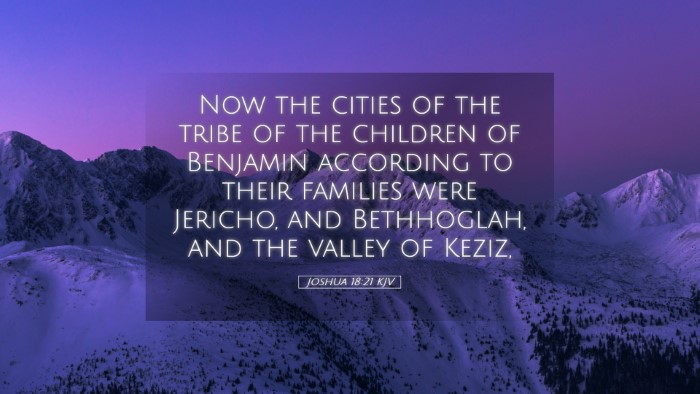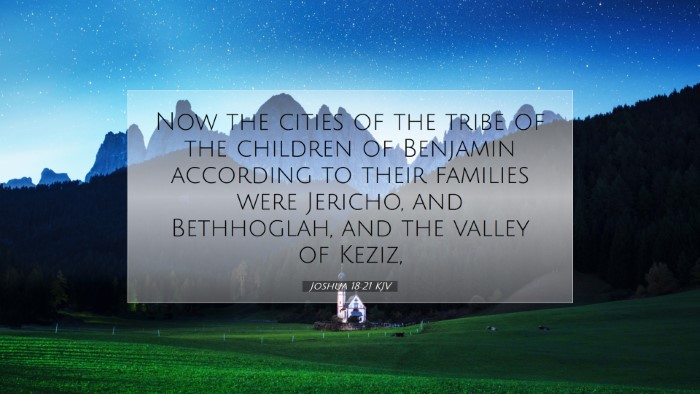Commentary on Joshua 18:21
Joshua 18:21 states: "Now the cities of the tribe of Benjamin according to their families were Jericho, and Beth-hoglah, and the valley of Keziz."
Context and Overview
This verse is part of the distribution of land among the tribes of Israel. The tribe of Benjamin, being the smallest tribe, had its inheritance carefully delineated. This allocation was significant because it served as a testament to God's faithfulness in fulfilling His promises to the Israelites as they settled in Canaan. The cities mentioned reflect both historical and geographical significance, showing the importance of land parcels in ancient Israel.
Historical Significance
Matthew Henry highlights that the cities listed are not merely geographical markers; they represent the heritage and future of the tribe of Benjamin. The mention of Jericho, for instance, connects back to the miraculous events surrounding its conquest, underscoring God's intervention on behalf of Israel.
Albert Barnes provides insight into the significance of the locations mentioned, explaining that each city held economic and strategic importance during the time of the conquest and settlement. This allocation allowed for a strong presence in key areas, which was essential for the tribe's survival and prosperity.
Theological Implications
The distribution of land is a reflection of God's sovereignty and faithfulness. As recorded by Adam Clarke, each city represents God’s providence in guiding His people to their inheritance. Benjamin's cities were not just a matter of physical land but were imbued with spiritual significance; they represent the divine order in Israel’s settlement.
Furthermore, the mention of specific locations serves to remind the Israelites of their history and the lessons from their past, emphasizing the theme of remembrance throughout the Scriptures.
Application for Today
For pastors and theologians, this verse exemplifies the importance of understanding God’s design in the allocation of resources and blessings within the community of faith. Just as Joshua and the leaders of Israel were tasked with distributing land, church leaders today must wisely allocate gifts, resources, and responsibilities among their congregations to promote unity and effectiveness in ministry.
Students of the Bible can draw from this passage a deeper understanding of the historical context of God's people. The specificity of the cities mentioned encourages careful study of Scripture, revealing insights into God's plan and the ongoing narrative of redemption throughout history.
Concluding Thoughts
The cities of Benjamin serve as a reminder of both the challenges and blessings experienced by the Israelites during their conquest of Canaan. The faithfulness of God is illustrated through His provision, as He not only promised land to Israel but also delivered them to the very places they now occupied. As believers reflect on this passage, may it inspire them to recognize and embrace their own God-given inheritance, both in terms of spiritual blessings and in the fulfillment of His promises in their lives.


